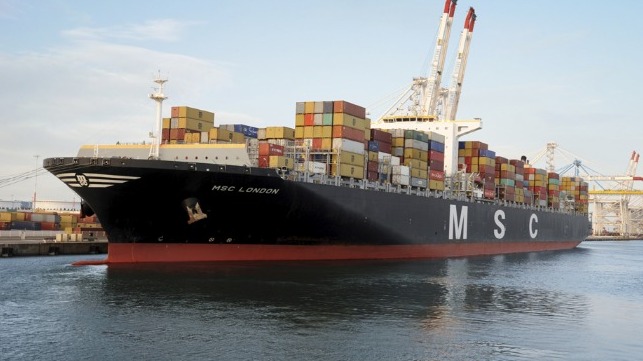Digitalization Advances with MSC Launching Global E-Bill of Lading

Supporting the growing drove through the maritime industry for increased use of digitalization, MSC Mediterranean Shipping Company announced it is taking a lead in the shipping industry officially introducing the electronic bill of lading (eBL) for all customers around the world. After running successful pilot projects in select countries since 2019, MSC is now introducing its digital solutions to all customers worldwide, paving the way for widespread eBL adoption.
Introducing an eBL solution is seen by many in all aspects of maritime operations as a critical step in the overall digitalization of the shipping industry. Research from the Digital Container Shipping Association estimates that by achieving 50 percent eBL adoption by 2030, the industry could potentially save more than $4 billion per year. In addition to the significant cost savings, the eBL offers a wide range of benefits to shippers, including eliminating the “document transportation” factor from the supply chain. Shippers can transfer original and negotiable electronic documents across borders fastest and with less risk of forgery, fraud, loss, or human error.
The industry became increasingly aware of the potential of digitalization in the past year as efforts sought to limit person-to-person interaction during the pandemic. The dramatic increases in volumes and bottlenecks forming at ports also highlighted the need to speed and smooth the processing of cargo at all points along the shipping chain.
“Traditionally, the shipping industry has relied quite heavily on physical paper documents, and among these, the BL is the most important transport document in international trade,” said André Simha, Global Chief Digital & Information Officer at MSC. “While there have been attempts to create an eBL solution in the past, we are now in a position to introduce a solution that can pave the way to mass eBL adoption, which will mean significant savings for the shipping industry. Eliminating paper from the shipping transaction will make every aspect of commercial container shipping better, faster, more effective, more secure, and environmentally friendly.”
MSC will be using a solution on an independent blockchain platform WAVE BL that will enable shippers and other key supply chain stakeholders to receive and transmit the bill of lading document electronically, without any change or disruption to day-to-day business operations.
WAVE BL is a blockchain-based system that uses distributed ledger technology to ensure that all parties involved in a cargo shipment booking can issue, transfer, endorse and manage documents through a secure, decentralized network. Users can issue all originals, negotiable or non-negotiable, and exchange them via a direct, encrypted, peer-to-peer transmission. It’s also possible for users to amend documents.

that matters most
Get the latest maritime news delivered to your inbox daily.
“MSC has chosen WAVE BL because it is the only solution that mirrors the traditional paper-based process that the shipping and cargo transportation industry is used to,” says Simha. “It provides a digital alternative to all the possibilities available with traditional print documents, just much faster and more secure.”
To further encourage the adoption of the eBL, MSC said the WAVE BL platform can be used free of charge throughout 2021 for exporters, importers, and traders. Users only pay for issuing the original documents, and they do not need to invest in any IT infrastructure or make operational changes to use the service.
